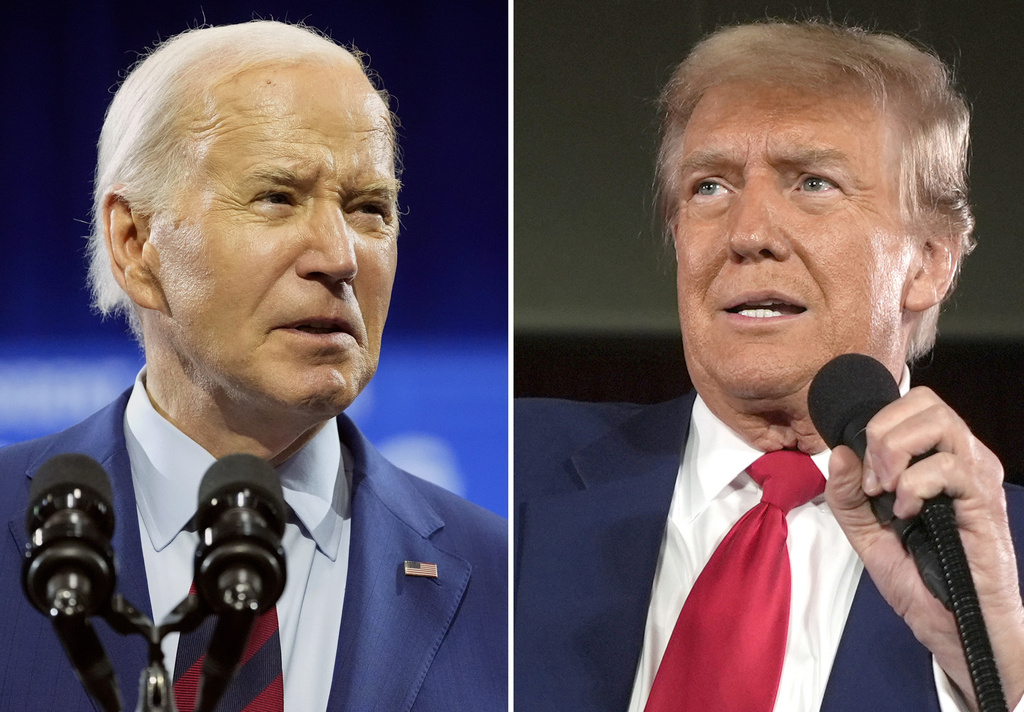

When President Joe Biden threw down the debate gauntlet, former President Donald Trump quickly accepted the challenge.
Whether this was the product of careful behind-the-scenes negotiations, as it appeared from how quickly the June CNN debate, in particular, came together, or Trump believing he could not look less eager to debate than Biden, the terms are favorable to the incumbent.
No live audience participation. No interruptions or commentary during the other candidate’s answers. No conservative media hosting or, by first impressions, moderating — old-school networks only. Trump has dubbed even Fox News a “hostile network,” though he was willing to do a third debate there in October, while the Biden campaign is not.
Trump’s ability to turn even the most sterile and sedate environment into something more circuslike cannot be underestimated. But these ground rules seem to work against many of Trump’s proven debate tactics.
Biden taunted Trump in his Wednesday announcement, with the incumbent saying his predecessor had lost both of their debates in 2020. Trump boycotted the Republican primary debates this time around, having mostly dominated them in 2015-16.
“Why would I allow people at 1% or 2% and 0% to be hitting me with questions all night?” Trump told Fox’s Bret Baier last year. Pressed by Newsmax’s Eric Bolling, Trump responded, “It’s not a question of guts. It’s a question of intelligence.”
Just as Trump was able to make the huge 2016 field of established Republican candidates look small in comparison to his reality TV persona, as a former president, he was able to keep the 2024 GOP field from getting on his level by refusing to share a stage with him. Despite “Donald Duck” and “coward” taunts from former New Jersey Gov. Chris Christie, the only candidate who was able to distinguish herself in Trump’s absence was former U.S. Ambassador to the United Nations Nikki Haley. She was rewarded with runner-up status and continues to win a nontrivial share of the vote after dropping out but only won two primaries and lost her home state.
Nevertheless, Trump has always clamored for debates with Biden. “Frankly, I think we have an obligation. When you have the final Republican, the final Democrat, you have the two people, you have to debate regardless of polls,” he told Fox’s Laura Ingraham. He said he was happy to do “as many as necessary.”
Trump has consistently cast doubt on Biden’s willingness or ability to debate. “I would like to do it starting now,” the presumptive Republican nominee said in February. “I don’t think [Biden’s] going to debate though. I really don’t think so.”
The former president has been a stickler for debate ground rules in the past. He refused to do a virtual debate in 2020, for example. He also disliked the Republican National Committee not consulting him about networks or moderators for their sanctioned debates this cycle. But Trump appears to believe the contrast between his vigor and the 81-year-old Biden’s will be sufficient to warrant any debate.
This carries a risk for Trump. One is that if he is the candidate who has a verbal flub or shows his age, it could erode one of his major advantages over the Democrat. Also, if Republicans set expectations for Biden too low, as they did before this year’s State of the Union address, it might make it easier for the president to meet or exceed them.
Biden has seldom had major problems in big moments or when he has had time to prepare. The one arguable exception was his hastily scheduled press conference after special counsel Robert Hur’s report described the president as an “elderly man with a poor memory.”
Many thought Trump was too aggressive with Biden in their 2020 debates. It is possible that even if Trump is able to knock Biden off his game, it will come across to voters as nasty. Biden will attempt to use the debates to frame the election as a binary choice between Trump and himself, as opposed to a referendum on his own unpopular presidency.
The risks for Biden are also obvious. His advanced age has become a huge liability in his reelection campaign. His condition may not be as bad as some Republicans make it out to be, but he is still noticeably slowing down compared to a few years ago. Democrats try to console themselves by citing Trump’s senior moments, but many of those come during long, freewheeling, and heavily extemporaneous speeches few professional politicians would even attempt, rather than heavily scripted events. Biden may also need to do more to shake up the race since he is presently trailing.
Both candidates have the added insurance of the debates being so early. The debates’ historical effects on the November results are themselves highly debatable. A debate in June is likely to be a forgotten event by Election Day. Sen. John Fetterman (D-PA) weathered a particularly bad one to win his seat during the midterm elections.
One wildcard is whether Biden and Trump can keep independent candidate Robert F. Kennedy Jr. out of the debates. That seems a more plausible motivation for the Biden camp blowing up the debate commission than the New York Times report that “Biden aides are still furious that Mr. Trump debated Mr. Biden in 2020 and appeared visibly under the weather, announcing soon after the debate that he had tested positive for the coronavirus.”
Participation in the 1992 debates helped independent Ross Perot remain a major candidate, especially after he abruptly departed and then reentered the race. Ronald Reagan debated independent John Anderson in 1980, but it was widely believed the Illinois congressman would siphon more votes from President Jimmy Carter, who refused to share a stage with him.
It’s not clear which major party candidate Kennedy hurts more. The New York Times cited the “chance that Mr. Kennedy reaches the 15 percent national polling threshold to qualify for the commission’s debates” as a reason Biden wished to forgo them.
CLICK HERE TO READ MORE FROM THE WASHINGTON EXAMINER
“The Biden campaign views Mr. Kennedy as a spoiler candidate and people close to the president worry that with the Kennedy name he could attract support from voters who might otherwise support Mr. Biden,” the newspaper’s Maggie Haberman and Jonathan Swan write, though they also report “mutual interest” from both campaigns in “excluding” Kennedy.
Yet Kennedy posted on social media on Wednesday night that he planned to meet CNN’s debate eligibility criteria next month.






